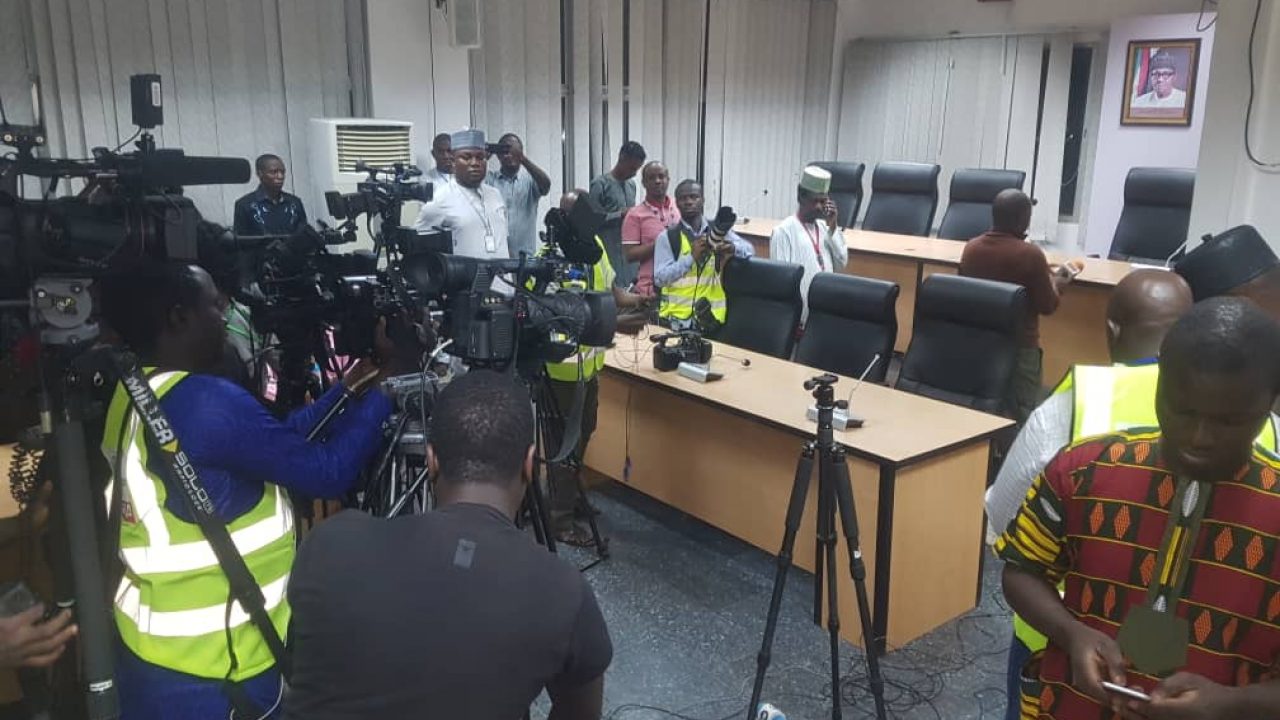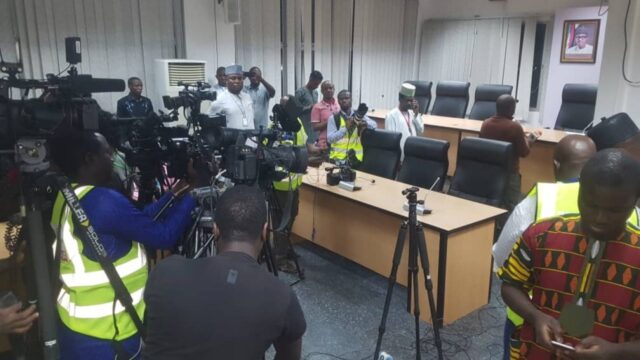
Journalists in Nigeria who do not hold journalism or media-related degrees may face up to two years in jail or a fine of N200,000, if a new bill in the house of representatives is passed and signed into law.
The bill is also seeking to raise the minimum qualification for journalists in the country to bachelor’s degree or higher national diploma (HND) in journalism, media art, communication or related courses.
Those who have a first degree in any other course will have to obtain a postgraduate certificate in the aforementioned courses of study.
The legislation is contained in the Nigerian Press Council Amendment Bill 2019 sponsored by Francis Agbo, the lawmaker representing Ado/Ogbadigbo/Okpokwu federal constituency in Benue state.
The bill which has passed first reading and slated for second reading seeks to amend some key sections of the Nigerian Press Council Act Cap N128 LFN 2004.
The proposal seeks to amend sections 19(1)(a)-(b), 21(5)(a)-(b) and 35 of the Nigerian Press Council Act Cap N128 LFN 2004.
The Nigerian Press Council Act Cap N128 LFN 2004 was first enacted in 1992 to repeal the Nigerian Media Council Act 1988 and established the Nigerian Press Council (NPC). Under this Act, the NPC is recognised as the body charged with the responsibility of overseeing the activities of Nigerian press.
TheCable obtained a copy of the bill with a view of analysing the sections and comparing them with assented sections of the Nigerian Press Council Act Cap N128 LFN 2004.
JOURNALISM OR MEDIA-RELATED DEGREES MANDATORY
The first casualty of the proposed amendment is section 19, which is titled: “Registration as Journalist”. The proposal seeks to delete section 19 (1)(a) of Nigerian Press Council Act Cap N128 LFN 2004 and replace it with a new clause for registration as a journalist.
The section 19 (1)(a) states:
19. Registration as Journalist
(1) Subject to rules made under this Act, a person shall be entitled to be fully registered under this Act if-
(a) he has attended a course of training recognised by the Council so acquired,
with the cognate experience recognised by the Council; or
But the proposed legislation states that:
19 (1)(a) he holds a first degree, higher national diploma certificate or its equivalence in Journalism, media art, or communication from any higher institution in Nigeria or elsewhere
Like section 19(1)(a), in the proposal, section 19(1)(b) will also be replaced with a new clause.
The section 19 (1b) states:
19(1b) the course was conducted at an institution so approved, or partly at one such institution and partly at another or others; or
The new clause states:
19 (1b) in the case of a person who has a first degree in any other course, he shall within five years obtain a postgraduate certificate in journalism, media art, communication, or related field from any higher Institution in Nigeria or elsewhere.
IMPLICATIONS OF THESE PROPOSED CLAUSES
Journalists who do not hold a bachelor’s degree or higher national diploma (HND) in journalism, mass communication, communication art, media art and other related courses may not be allowed to practice journalism or be recognised as a journalist.
The section 19 of the Nigerian Press Council Act Cap N128 LFN 2004 did not clearly state the course of study required for the registration of a journalist, but the proposed amendment spelt out the course of study for registration and recognition as a journalist.
Many journalists excelling in their fields do not have any degree in journalism or related courses. Some studied science or social science-related courses.
For example, Fisayo Soyombo, multiple award-winning journalist and pioneer editor of TheCable, whose investigative works have won many national and international awards, holds a bachelor’s degree in animal science from the University of Ibadan. Some of the likes of Soyombo, who do not hold media-related degrees are doing well in the Nigerian media space.
If the bill is passed and signed into law the likes of Soyombo will have to obtain a postgraduate certificate in journalism, media art, communication or related field to practice.
N200k FINE AND TWO YEARS IN JAIL FOR “UNTRAINED” JOURNALIST
The proposed legislation also seeks to replace the provisions of sections 21(5)(a)-(b) of the Nigerian Press Council Act Cap N128 LFN 2004. Section 21 of the Act is titled: “Offences”, which highlights the penalties for offences committed by journalists who are not registered by the council. But in the new legislation, the ”penalties” are for journalists who do not hold degrees in journalism or other related courses.
Section 21 (5) of the Act states:
(5) Where any person has been convicted of an offence under this section of this Act-
(a) in a High Court, he shall be liable to a fine not exceeding N5,000 or imprisonment for a term not exceeding 2 years or to both such fine and imprisonment and to an additional fine of N200 for each day during which the offence continues; and
(b) in a Magistrate Court, he shall be liable to a fine of N3,000 and to an additional fine of N100 for each day during which the offence continues.
The proposal seeks to repeal the clauses of the above section and stiffening the punishment for journalists who do not hold degrees in journalism or other related courses.
5 ( a) in a High Court, he shall be liable to a fine not exceeding N200 , 000 or imprisonment for a term not exceeding 2 years or to both such fine and imprisonment and an additional fine N500 for each day during which the offence continues; and
(b) in a Magistrate court , he shall be liable to a fine of N 300,000 and to an additional fine of N500 for each day during which the offence continues.
IMPLICATION OF THESE CLAUSES
If the bill is passed and implemented, journalists who do not hold degrees in journalism or other related courses, may risk a fine of N200,000 or imprisonment for a term not exceeding two years. The legislation seeks to stiffen the punishment and fine for untrained and fake journalists. Journalists, who do not hold degrees in journalism or other related courses, will be treated as “untrained and fake journalists’’ and punishment for offences stated in section 21 of the Act will be applicable to them.
Unlike sections 19(1) and 21(5) that the proposal seeks to delete certain paragraphs; for section 35, it seeks to add a new subsection to make the subsections three. Section 35 of the Act is titled: “Submission of annual performance returns”, which highlights how publishers of newspapers and magazines should submit a return on the performance of their organisations.
The bill adds this subsection to section 35:
Subsection 3: A journalist shall be entitled to monthly salary payable by the publisher, owner or printer which the report of payment of the salary shall be included in the return of performance of newspaper, magazine or journal to be submitted to the council.
IMPLICATIONS
This may be a beneficial provision to Nigerian journalists because it states that they are entitled to monthly salary payable by their publishers. Although, it is silent on the timing for the payment.
If the bill is passed and signed into law, media owners will be accountable to the council as regards the payment of journalists’ salaries.
RATIONALE FOR THE AMENDMENT
Andrew Agbese, media aide to the lawmaker who sponsored the bill, said the bill will redefine journalism practice and curtail quackery in the profession.
“The Bill has aroused interest in the media, given the extent quacks and fakes have infiltrated the industry, bringing the image of journalists to an all-time low in Nigeria,” he said in a statement.
“The Bill, when passed into law will address these challenges by redefining and refining the media industry and by extension, strengthening democracy and hence the need to define who a journalist is, what qualification qualifies him to be a journalist, and stipulates punishment for defaulters and quakes.”
PREVIOUS FAILED ATTEMPTS TO AMEND OR REPEAL THE ACT
There have been failed attempts to either amend or repeal the Nigerian Press Council Act Cap N128 LFN 2004 in the past.
In 2009, Abike Dabiri-Erewa, chairman of the Nigerians in Diaspora Commission (NIDCOM), proposed a bill seeking to repeal the Act when she was a member of the house of representatives.
Dabiri-Erewa’s bill was titled: “An Act to Provide for the Repeal for the Nigerian Press Council Act 1992 and Establish the Nigerian Press and Practice of Journalism Council.” The bill sparked controversy as stakeholders in the media rejected it, saying it is a move to gag the press.
In 2019, Odebunmi Olusegun, a member of the house of representatives, representing Surulere/Ogo-Oluwa federal constituency, Oyo state, sponsored a similar bill, which is currently at the committee stage. Two years later, the bill is yet to proceed to the next stage.







